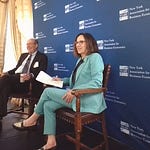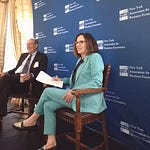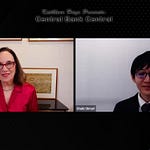Alan Blinder is a self-proclaimed policy dove. Which makes it all the more important that he not only sees why the Federal Reserve is signaling that it could be ready to pause rate cuts for awhile, he is in favor of monetary policy officials going ahead and doing it. This former Fed vice chair, noted Princeton economist, and prolific writer and researcher, says rate hikes (yes, hikes) could even be on the table this year if inflation doesn’t start falling again and especially if it starts rising again,
I caught up with Alan after the government’s producer price index showed that the latest monthly wholesale prices had eased a bit and one day before the consumer price report was supposed to show stickiness in some key price components.
He stepped back from the latest numbers to at look at what he sees as the recent troublesome trend.
Unexpected by Blinder: Inflation No Longer Coming Down 00:01:15
It looks like it's taking a pause, which is not quite what I, you know, if you asked me to guess six months ago, that's not what I would have guessed six months ago or even three or four months ago: it was coming down, down, down…Unmistakable. Last couple of months…it's not so obvious that it's coming down. And that has not been lost on the FOMC in general, and especially on the more hawkish members of the of the (Federal Open Market) Committee.)”
I asked him: “How much will the stronger-than-expected December jobs report factor into the Fed’s decision to sit back and pause at its January meeting?”
Blinder Sees Strong Jobs Data Also Support Fed Pausing Rate Hikes Now 00:10:17:05 - 00:10:38:01
I strongly guess now there's going to be more data out between now and then, but I strongly guess they're going to pause and…and a reason for that is what you were just talking about (the stronger-than-forecast jobs report) that there's plenty of disagreement.
“A Few” on FOMC Would Hike Rates a Little; Powell Will Say “Let’s Just Hold” 00:10:38:03 - 00:10:58:00
I'm sure there are a few people on the FOMC who, if they were given free rein, they were in charge, they'd be putting rates up a little bit. Yeah, I'm sure there are more people that, if given free rein, would say, let's just hold. And I think Powell will be one of those.
Blinder Stresses Even as Longtime Dove He “Enthusiastically” Favors Fed Pause 00:11:55:24
Going back to my time in the Fed, I lean dovish, so I'll say right off the bat, leaning dovish as I do, I would be certainly enthusiastically in favor of pausing right now, which is what the committee is going to do and seeing whether I'm right, not just me. <If> a number of people are right… inflation will resume its gradual downward track. If that's wrong and it starts to create a gradual upward track, then I think the committee, including the dovish members of the committee, have to think about raising interest rates not dramatically.
How about the tragedy and destruction of the wildfires in California - the biggest state in the U.S. which if it were a country would be the fifth biggest one in the world? How hard will this hit the economy? Will it affect the Fed’s calculation of its policy path in the months ahead?
Wildfires Will Have Profound Effects on California Economy, U.S. Data in Near Term 00:27:06:11
I don't think anybody would want to swear to the accuracy of data coming out of California, which is, as you just correctly said, is a very large chunk of the economy. It's going to do some obviously bad things to inflation. Stuff's expensive. They're hard to get. It's going to do some obviously bad things to employment. Think of all those businesses that got burned down The next time the BLS, or the Census Bureau comes around asking, there's nobody home to answer how many people work here. So it's going to have some profound effects, I think in the near term.
I asked Alan if the Fed may see this as one more reason to sit back and pause rate cuts now?
Wildfires to “Wreak Havoc” on Eco Data, Reinforce Fed Decision to Pause Hikes 00:30:21:08 -
I think the main reason to increase the attractiveness or advisability of a pause is what it’s going to do to the data system. It doesn't take much… if you're comparing… the difference in the monthly payroll between 100,000 and 160,000, this event is a big deal relative to that 60,000, a very big deal. And it's really going to wreak havoc on the ability to interpret the near-term data for the next couple of months.
ALAN S. BLINDER is the Gordon S. Rentschler Memorial Professor of Economics and Public Affairs at Princeton University, and a regular columnist for The Wall Street Journal.
Dr. Blinder served as Vice Chairman of the Board of Governors of the Federal Reserve System from June 1994 until January 1996. In this position, he represented the Fed at various international meetings, and was a member of the Board's committees on Bank Supervision and Regulation, Consumer and Community Affairs, and Derivative Instruments. He also chaired the Board in the Chairman's absence. He speaks frequently to financial and other audiences, often through the media.
Before becoming a member of the Board, Dr. Blinder served as a Member of President Clinton's original Council of Economic Advisers from January 1993 until June 1994. There he was in charge of the Administration's macroeconomic forecasting and also worked intensively on budget, international trade, and health care issues.During presidential campaigns, he has served as economic adviser to Bill Clinton, Al Gore, Hillary Clinton, and the Biden-Harris campaigns. He continues to advise members of Congress and officeholders. He also served briefly as Deputy Assistant Director of the Congressional Budget Office when that agency started in 1975, and has testified before Congress on a wide variety of public policy issues.
Dr. Blinder was born on October 14, 1945, in Brooklyn, New York. He earned his A.B. at Princeton University in 1967, M.Sc. at London School of Economics in 1968, and Ph.D. at Massachusetts Institute of Technology in 1971–all in economics. Dr. Blinder has taught at Princeton since 1971, and chaired the Department of Economics from 1988 to 1990. He was the Founder and either the Director or Co-Director of Princeton's Griswold Center for Economic Policy Studies from 1989 to 2011.
Dr. Blinder is the author or co-author of 23 books, including the textbook Economics: Principles and Policy (now with the late William Baumol and John Solow), which is now in its 14th edition, and from which over three million college students have learned introductory economics. His best-selling book, After the Music Stopped: The Financial Crisis, the Response, and the Work Ahead (2013) won several awards. Advice and Dissent: Why America Suffers When Economics and Politics Collide (2018) was published by Basic Books. His latest book, A Monetary and Fiscal History of the United States, 1961–2021 was published by Princeton University Press in October 2022. Dr. Blinder has written scores of scholarly articles on such topics as fiscal policy, central banking, offshoring, and the distribution of income. He also appears frequently on CNBC, Bloomberg TV, and elsewhere.
Dr. Blinder was previously President of the Eastern Economic Association and Vice President of the American Economic Association. He has been elected a Distinguished Fellow of the American Economic Association, and a member of the American Philosophical Society, the American Academy of Arts and Sciences, and the American Academy of Political and Social Science (AAPSS). In October 2023, he was awarded the Daniel Patrick Moynihan Prize by the AAPSS.
He also serves on academic advisory panels for the Hamilton Project, the Center for American Progress, and the Washington Center for Equitable Growth. He is a member of the Council on Foreign Relations and the Bretton Woods Committee, and a former governor of the American Stock Exchange.
Dr. Blinder has also had a successful business career, co-founding two entrepreneurial start-ups. He and his wife, Madeline, live in Princeton, NJ. They have two sons and four grandchildren.














Share this post